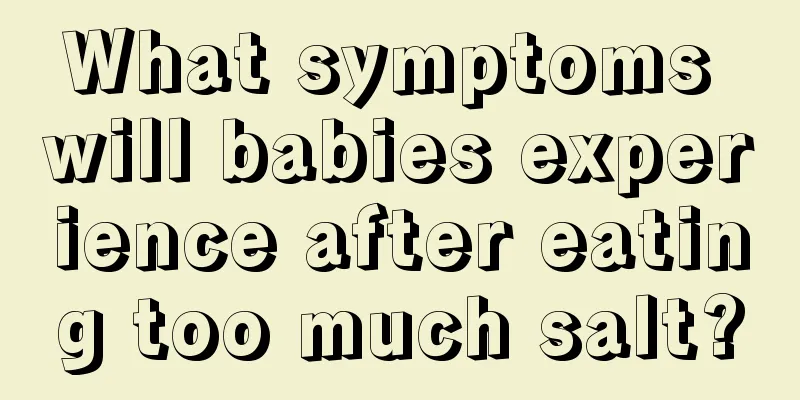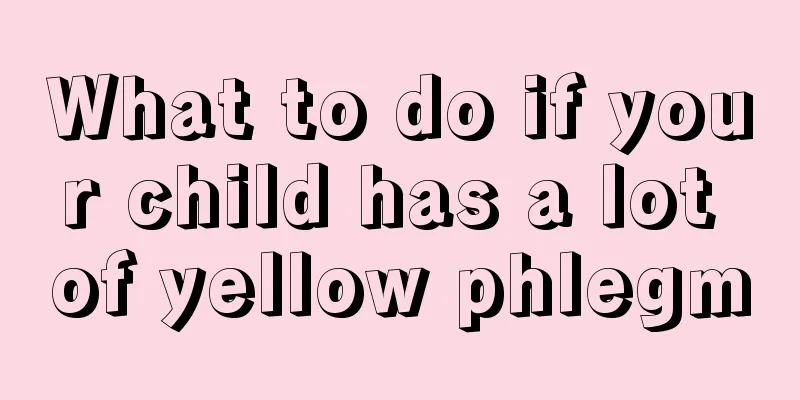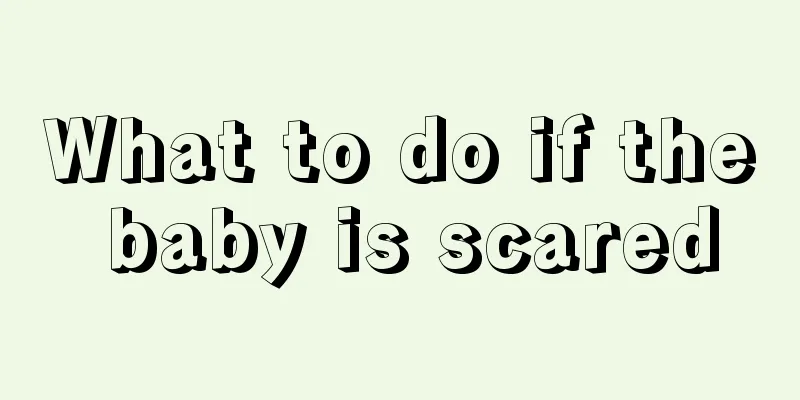What symptoms will babies experience after eating too much salt?

|
Children under one year old should not eat too much salt, including when cooking. Only a little bit can be put in dishes. It is best if they can hardly taste any salt. In fact, although salt increases metabolism, it will also increase the burden on kidney metabolism and affect the health of kidney function. If the baby eats too much salt, it will lead to less saliva secretion in the mouth, causing blisters and a white tongue. 1. If babies eat too much salt, it will increase the burden on kidney metabolism, affect kidney function and health, and also increase the burden on the heart, causing edema, high blood pressure, etc. 2. Eating too much salt can make babies more susceptible to colds. (1) Excessive salt intake can reduce oral saliva secretion, allowing bacteria and viruses to exist in the upper respiratory tract; (2) The osmotic effect of high salt can kill normal bacteria in the upper respiratory tract, giving pathogens the opportunity to "stir up trouble" and cause upper respiratory tract infection; (3) High salt can also inhibit the proliferation of respiratory mucosal epithelial cells, causing them to lose their disease resistance. 3. Other studies have shown that the higher the sodium concentration in children's blood, the shorter they are; the more salt they consume, the worse their calcium absorption. How much is 1 gram of salt? 1 gram of salt is equivalent to the size of a soybean. Usually one tea egg contains 1 gram of salt, and one salted duck egg contains 2-3 grams of salt. Unless there are special circumstances, children under 1 year old should not be given salt. Children aged 1-3 years old should try to eat less salt or even no salt. Even if children are over 3 years old and eat with adults, you still need to consider giving them a light taste when cooking. How much salt should infants and children eat? According to the latest version of the reference intake, children aged 1-3 years old need 700 mg of sodium per day (equivalent to 1.8 g of table salt), which is 350 mg more than infants aged 6-12 months. But generally speaking, you can get enough sodium from food, such as milk, staple foods, meat, green leafy vegetables, fruits, etc. Therefore, some data suggest that when feeding infants and young children, children aged 1-3 should try to eat less salt or even no salt. This can not only help babies develop good habits of light eating, but also reduce the incidence of hypertension and cardiovascular and cerebrovascular diseases in the future. Children aged 4-6 years old need about 900 mg of sodium per day (equivalent to 2.3 g of table salt). In addition to the sodium contained in the food itself, the sodium that must be obtained through table salt is not much, 1-2 grams of table salt is enough. The salt intake of children over 6 years old should be controlled within 3-5 grams. But for the sake of children's future health, it is better to let them consume as little salt as possible. Precautions for feeding salt to babies 1. Eat a light diet as a family If parents have a strong taste for food, the salt content in their children's diet will also increase. It is understood that the salt content in the diet of Chinese families generally exceeds the standard. When parents prepare meals for their children, they must pay attention to reducing the salt content. 2. “Add salt to meals” If your baby suffers from diseases such as heart disease, nephritis and respiratory tract infection, the salt intake in his diet should be strictly controlled. You can adopt the method of "adding salt during the meal", that is, add a little salt when the dish is out of the pot, or add no salt and then add salt when the dish is cooked and served on the table. This will ensure that the salt only adheres to the surface of the dish, so that it tastes tasty with just a little salt. 3. In special cases, the amount of salt should be slightly increased If your baby sweats a lot in summer, or has diarrhea or vomiting, your baby's salt intake can be slightly increased than usual. Attention should be paid to supplementing the baby's diet. 4. Eat less pickled foods People in the south like to eat pickled mustard greens, salted fish and bacon, etc. These foods are generally high in sodium, so babies should try to avoid them. In addition, bean paste, chili sauce, mustard tuber, pickled cabbage, pickled cucumbers, yellow paste, soybean paste, fermented bean curd, salted duck eggs, etc. should also be avoided for babies to eat. The daily diet in the north is mostly salty and savory. The taste can be improved appropriately by replacing the salty taste with sweet or sour. Preventing high blood pressure starts from childhood In fact, in 2002, the number of patients with hypertension in my country had reached 160 million, with an average annual increase of 3 million. It is estimated that there are more than 200 million people with hypertension in my country, and more than 2 in every 10 adults suffer from hypertension. Hypertension can run in families. Epidemiological surveys on hypertension have confirmed that the blood pressure level and the prevalence of hypertension in the population are closely related to the amount of salt intake. In areas where people consume more salt, the incidence of hypertension is also correspondingly higher. Therefore, in order to reduce the risk of babies developing high blood pressure when they grow up, it is imperative to advocate a light and low-salt diet rather than alarmist talk. Controlling and reducing salt intake from infancy is important for preventing high blood pressure in adulthood. |
<<: How to deal with the hard lumps where babies get injections?
>>: What are the symptoms of liver function in children?
Recommend
How to relieve retching in newborns
Every time a newborn baby retches and asks for le...
What to do if your child has cavities?
It is well known that children prefer to eat swee...
What is the reason for six fingers in newborns?
Newborns with six fingers are actually a phenomen...
What to do if your child has hunchback?
Hunchback in children is the same as hunchback in...
Neonatal intracranial infection
I believe many people know that the body of a new...
ADHD in children
Every child is a gift from God to his or her pare...
What should I do if my child has a hunchback?
As parents, of course we hope that our children c...
Swollen lymph nodes in the neck of a child
Any disease is very harmful to human health. In t...
What to do if a 10-year-old child has a persistent high fever
High fever is very common, usually caused by cold...
Why are baby's eyes red?
There are many parents who are particularly worri...
What should children drink to grow taller
Although we all know that how tall a person can g...
Causes of fever in babies
Fever in babies is a very common symptom of the d...
White spots on newborn's belly
I believe that many parents will find white spots...
Memory training games for kids
Nowadays, almost every family has only one child,...
Is it hereditary to not have breasts at the age of 14?
For women, the development of secondary sexual ch...









